Advance Online

Advance Online
The Next Chapter
Meet the woman selected to author the next pages in the epic tale of ending psoriatic disease.

Meet the woman selected to author the next pages in the epic tale of ending psoriatic disease.
We use cookies to offer you a better experience and analyze our site traffic. By continuing to use this website, you consent to the use of cookies in accordance with our Privacy Policy.